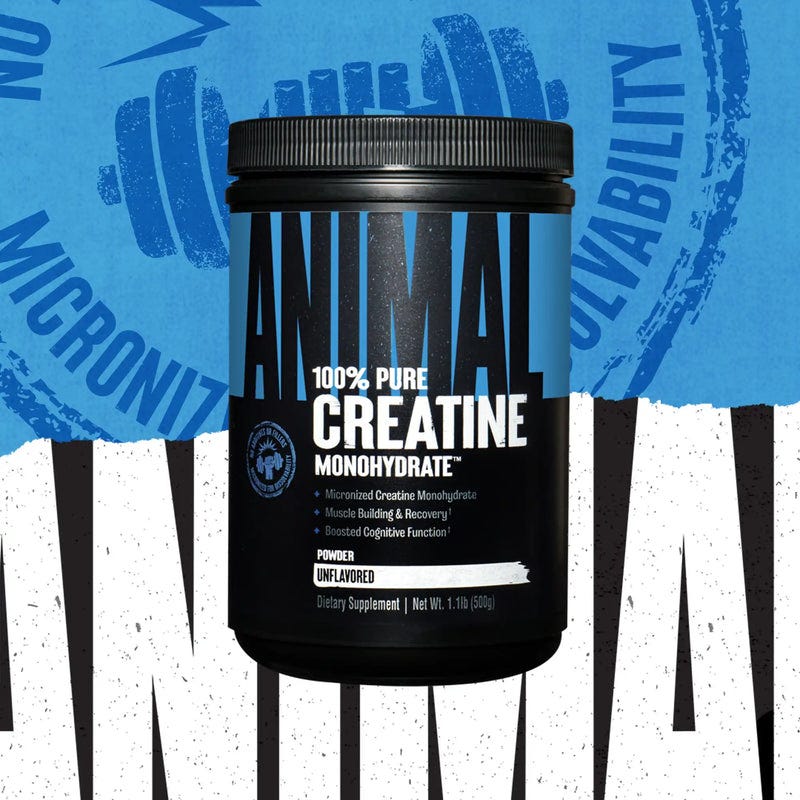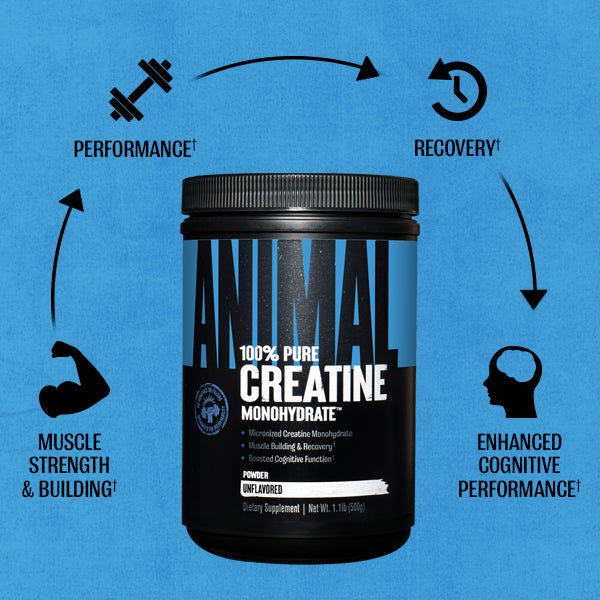Maximizing Performance with Creatine on a Meat-Driven Diet
Creatine is one of the most rigorously studied an commonly used ergogenic dietary supplements on the market. It has a host of benefits for both cognitive and physical performance, and is extremely safe. However, can you get “enough” on an animal-based diet? How much even is “enough?”
General recommendations for creatine intake (dietary or supplemental) are usually 3-5g / day; though this can be as high as 10g / day for larger athletes — approximately 0.3 - 0.8 g / Kg / day (1).
Creatine offers a host of benefits to performance, typically related to high intensity (i.e. anaerobic efforts like single or double reps, or short sprints)(2). However, there is also evidence that creatine supports glycolytic activity (e.g. metabolic threshold training)(3, 4). The benefits also appear to extend to hydration / heat related condition as well (5). Additionally, the side effects of creatine have innumerably been debunked (1.1).
The reference range of 3-5g / day is often referred to as “sufficient”; which we should all recall is to say “not-deficient” and is certainly not the same as “adequate” — or achieving a point of diminishing returns. In other words, we ought to also ask, what dosage / intake gives me the most return on investment?
Here are some ranges to consider:
5g supplemental creatine (presumably in addition to a few additional grams coming from dietary sources) in conjunction with SSRI anti-depressants was more effective at alleviating depressive symptoms than an SSRI-only control group. The effects were observed in as little as two weeks (6).
20g supplemental creatine showed improvements in cognitive tasks (7); which is independent from other research noting the benefits limited to sleep deprivation (8) or vegan / vegetarian diets (9).
Non-loading dosages of 0.1g / Kg / day have also been used with both adult and elderly populations (10, 11).
The argument for creatine’s role in our health and performance should be pretty clear by now. The question remains, as with all supplement discussions, are food sources alone adequate, to what ends, and at what costs?
The “ends” are pretty clear, see the many benefits above, but there are some novel benefits to “repeat sprint sports” such as grappling and MMA (12), particularly because of their combined frequency of both alactic and lactic energy systems.
The best dietary sources of creatine come from animal protein (13), at approximately the following ratios:
2g of creatine / lb of beef
2g of creatine / lb of tuna
2.3g of creatine / lb of pork
Where I’ve taken this argument before is grams of creatine relative to calories.
Beef (80/20 ground): 2g creatine / 1,100 calories / lb
Tuna: 2g creatine / 500 calories / lb
Pork (chop): 2.3g creatine / 1,100 calories / lb
This is relevant because when I got down to 5% body fat last summer, I weighed about 164 lbs (74 Kg) and was eating about 2,400 calories / day. For many bodybuilders to get down that low in body fat, they’re eating well below 2,000 calories / day.
At a recommended intake of 0.1g / Kg / day, and a body weight of 74 Kg; I would need to eat the following to get 7g of creatine:
~3.5 lbs of pork chops (3,300 calories)
~3.6 lbs of tuna (2,000 calories)
~3.5 lbs of 80/20 ground beef (~4,000 calories)
If someone absolutely doesn’t care about who they’re kissing, or breathing in the face of whilst grappling, fine. I’ll concede my entire argument if you want to eat 3.6 lbs of canned tuna every day — to say nothing of heavy metals!
Or, you could spend $0.50 / day and avoid all of that, but I digress…
Typically I weigh about 175 lbs (80Kg) and eat about 3,500 calories / day. Again, at 0.1g / Kg / day, I’d get the most benefit from ~8g of creatine / day. Let’s look at the food sources again:
3.4 lbs of pork chops (3,800 calories)
4 lbs of 80/20 ground beef (4,000 calories)
4 lbs of canned tuna (2,100 calories)
This looks much more feasible, particularly for the pork chops, and assuming some of the beef could be substituted for tuna. Because I want to keep these posts short, I won’t go into a full breakdown of what nutrients we may be missing if we exclude those little power houses known as eggs!
Understand that most of what you pay for in supplements in convenience… and branding. Hopefully there is a beneficial trade off as well, with minimal or no side effects. For me there is only potential benefit and no notable side effects other than a modest $0.25 / day since I take a half dose (2.5g).
We should also recall that a “placebo effect” is still a real effect that produces real results. So, if $0.25 help you feel like you’re accomplishing something or leaving no stone unturned, and there are no physical side effects, then I would support that decision for most folks given all the other things you could (and probably do) “waste your money” on.
Disclaimer: I receive a commission for sales made through links on this site.




